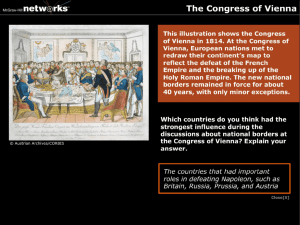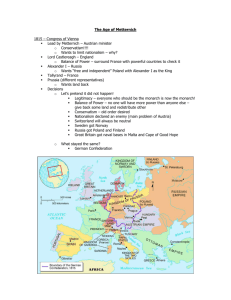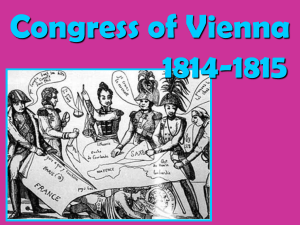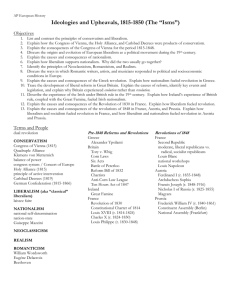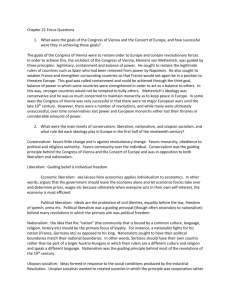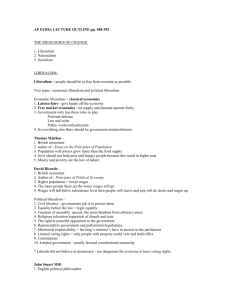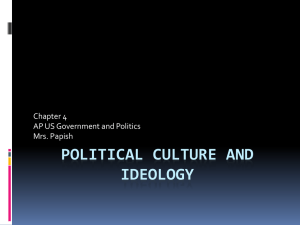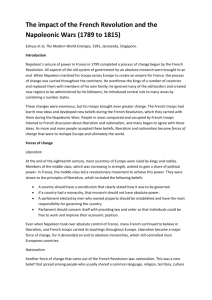Conservatism, Liberalism, Nationalism in 19th Century Europe
advertisement
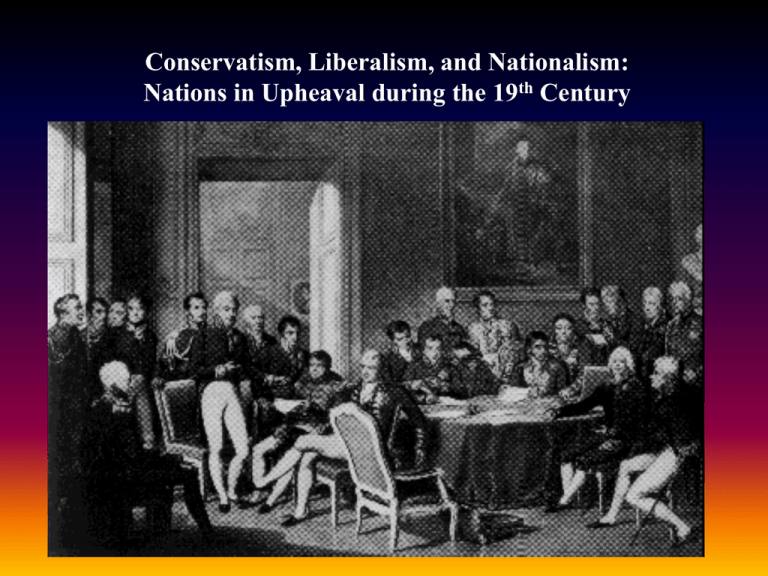
Conservatism, Liberalism, and Nationalism: Nations in Upheaval during the 19th Century Invasion of Russia fails Napoleon abdicates -1814 The Revolutionary wars, and the Revolution, were over. Or so it appeared… The Source of Revolutionary Disturbances “When Paris sneezes, Europe catches a cold. The disease must be cured, the volcano must be extinguished, the gangrene must be burned out with a hot iron.” Prince Metternich of Austria Opposed Liberalism and Nationalism of the French Revolution Map of Europe 1815 • Balance of Power – a new European order in which no single power was able to dominate. More than anything, they wanted to prevent another Napoleon figure from ever conquering Europe again. They want to replace French hegemony with an equilibrium. Want liberalism and nationalism BLOCKED as . liberal and nationalist uprising are what opened door to Napoleon. - Rejected liberalism and radical democracy -desires traditional government (absolute monarchy) in order to preserve the status-quo Edmund Burke, the founder of modern conservative thought, wrote: “The state was a partnership, but one not only between those who are living, but between those who are living, those who are dead and those who are to be born…No one generation therefore has the right to destroy this partnership.” CONSERVATISM continued: • Preserve the Status Quo: Peace, Stability, and Order is achieved by a Balance of Power. Conservatives: Edmund Burke, Prince Metternich Generally aristocrats of noble or royal blood The peacemakers of 1815 (Britain, Prussia, Austria, and Russia) were men who were backward-looking and conservative, who believed that liberalism was responsible for a generation of war and untold bloodshed and suffering. CONSERVATISM continued: • Belief in the Divine Right of Kings or Absolutism. • Traditions – feudal privileges, social hierarchies and orders, nobility, traditional Catholicism. The nobility was one of Europe’s most ancient institutions, and conservatives regarded tradition as the basic source of human institutions. -desires limited government in order to protect individual liberties. It is the ideology of Freedom: -Challenged absolute monarchy but rejected democracy. Thought the will of the majority might overcome the will of the individual -Favourable to the middle class Freedom of Assembly Right to Property Freedom of Press Equality of opportunity Freedom of Religion Freedom from arbitrary arrest Free Trade Freedom of Speech The origins of Liberalism: • The Enlightenment introduced the idea of a social contract based on natural rights and equality of men. • French Revolution instituted a new political order based on individual freedom • Such rights and freedoms would be guaranteed in constitutions as Liberalism demanded representative government as opposed to autocratic monarchy •Philosophy in Napoleonic Code which spreads to most of Europe -a sense of unity based upon shared characteristics: language, culture, historical experience, religion, ethnicity and geography. -Examples of nationalities that did not rule themselves in 1815 were Germans, Italians, and Poles. They wanted it – conservatives worried about more revolution. -Driving force behind change in 19th century -In this time, nationalism was encouraged by leaders not the people Roots of Nationalism • French Revolution: – – – – vs. Monarchical order “Liberty, fraternity, equality” Liberal ideas – freedom Armed struggle vs. oppressors *the days of multi-national empires and monarchies were numbered Reaction against Reaction of Congress of Vienna and Metternich Across Europe, liberals and nationalists tested Metternich system… Revolutions of 1848 • A.k.a.: • • Revolutions spring – “The Spring of Nations” up in Paris, Vienna, Piedmont, Berlin, Liberalism and others vs. Conservatism • Nationalism -One year later, almost all monarchs were restored, but the revolutions would not be forgotten. Revolutions of 1848 France was changed forever, however. Louis Napoleon Bonaparte III (nephew of Napoleon) (1808-1873) President of France 1848-1851 Emperor of France 1851-1871 Second French Republic + Second Empire • President Louis Napoleon: seen by voters as a symbol of stability and greatness • Dedicated to law and order, but wanted prestige and prosperity • Emperor Napoleon III, 1851: took control of gov’t in coup d’etat (December 1851) and became emperor the following year – 1851-1860: Napoleon III’s control was direct and authoritarian. – 1860-1870: Regime liberalized by a series of reforms. – France prospers enough to keep the people happy without giving them true democracy. – France becomes cultural capital of Europe Italy Mid-19th Century A Collection of Kingdoms and Republics Italian Unification - 1861-1871 • Nationalists tired of being ruled by and benefiting foreign powers (Austrian Empire) • Wanted a united Italy for Italians. • “Young Italy” – Nationalist, revolutionary movement defeated in 1848 • Passed on to Garibaldi and his “Red Shirts” Fought and defeated king of Sicily Cavour (North) & Garibaldi (South) Germany Mid-19th Century Confederation of German States Otto von Bismarck (1815-1898) • Most remarkable political leader of late 19th century. • Ruled Prussia from 1862, and Germany from 1871, to 1890, as Chancellor. • Blood and Iron - Speech to Parliament 1862 - Germany would only be united by blood and iron. Three Wars • To unite all the German speaking peoples, Prussia went to war three times in the period 1863-1870. – War with Denmark - 1863 – Seven Weeks’ War against Austria. 1866 – Franco-Prussian War -1870-1871 German Empire • Proclaimed on January 18, 1871 (most powerful nation in Europe) • William I became Emperor of Germany (Kaiser Wilhelm) • Bismarck became the Imperial Chancellor. Europe 1871 THE NATIONAL STATE: 1871-1914 • Ordinary people felt increasing loyalty to their governments • Politicians and parties in national parliaments represented the people more responsibly as increased suffrage (voting) spread • Governments came to believe public education important to provide society with well-informed and responsible citizens. • Governments often led by conservatives who manipulated nationalism to create a sense of unity and divert attention away from underlying class conflicts Conclusion • Conservatism, Liberalism and Nationalism The birth of modern ideologies • New nations changed the balance of power in Europe and set the continent on course for the events of the 20th century.
